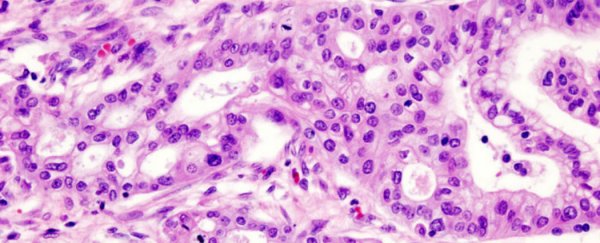Researchers in the US have figured out a way to turn pancreatic cancer cells back into normal healthy cells in mice by introducing a protein that's responsible for the regulation of proper cell growth and differentiation.
Named E47, this protein belongs to the basic helix-loop-helix (bHLH) family of proteins, which bind to another type of protein, called dimerize, and then to specific regions of DNA to help regulate the activity of certain genes. Some types of bHLH proteins can be used to repress certain genes, and others to activate them, so the team from the University of Sanford-Burnham decided to engineer human pancreatic cancer cells with a capacity for increased E47 production to see what would happen. Turns out, these cells were able to halt the growth of the pancreatic cancer, and revert them back into normal non-cancerous cells.
"For the first time, we have shown that over-expression of a single gene can reduce the tumour-promoting potential of pancreatic adenocarcinoma cells and reprogram them toward their original cell type," said one of the team, Pamela Itkin-Ansari, in a press release. "Thus, pancreatic cancer cells retain a genetic memory which we hope to exploit."
Publishing in the journal Pancreas, the team describes how they extracted some pancreatic cells from lab mice, engineered them to produce more E47, and reinstalled them back into the mice to see what would happen. They found that the these cells were able to halt the progression of early pancreatic cancer growth stages, and the likelihood of them forming tumours was greatly diminished, particularly when compared to regular pancreatic cells.
"The finding that we can differentiate these cancer cells back to a non-threatening phenotype is encouraging," said one of the team, Andrew M. Lowy, from the US National Cancer Institute's Pancreatic Cancer Task Force. "Indeed, there is a precedent for cell differentiation therapy in that the approach has been used to treat acute promyelocytic leukemia (APL) and some neuroblastomas successfully."
Pancreatic cancer might only be the ninth most common type of cancer in men in Australia, and the 10th most common in women, but according to the Australian Cancer Council, it's the fifth most common cause of cancer death over all. Hannah Osborne reports at The International Business Times that just 1 percent of affected patients are predicted to survive for 10 or more years with the disease, because symptoms often don't appear until it's in its later stages. We definitely need a solution.
The team now hopes to test the process out on human cells, to see if they can reproduce the results. If so, they'll go on to develop a drug that can automatically induce the over-production of E47 in the hopes that it could be used as a painless treatment for pancreatic cancer in the future.
Source: The International Business Times
